Dallas County’s bail practices are inconsistent with both of these constitutional principles. Felony judges in the county promulgate secured-bail schedules for all arrestees that operate like a menu, listing the fixed “price” of release for each crime and category of arrestee. The county’s magistrates, who impose bail in individual cases, treat these schedules as binding, which effectively means that Dallas County automatically detains those who can’t afford the secured bond amounts in the schedules. Magistrates make no individualized determination about the need for pretrial detention for particular arrestees, nor does the bail calculation account for the arrestee’s ability to pay.
A group of individual plaintiffs brought a class action challenging the constitutionality of Dallas County’s bail practices. The district court agreed that the plaintiffs were likely to succeed on their equal-protection claims — because Dallas County was effectively engaged in wealth-based detention, which is unconstitutional under Bearden v. Georgia, 461 U.S. 660 (1983) — but it declined to issue an order actually forbidding the defendants from engaging in wealth-based detention. Rather, the district court merely required that judges hold a hearing to consider alternatives to unconstitutional wealth-based detention, after which the judges were free to continue engaging in the exact same practices. On appeal, a panel of the Fifth Circuit mostly affirmed the district court’s injunction, agreeing that the Dallas County bail practices were unconstitutional, but also declining to order a “substantive” remedy actually prohibiting the unconstitutional practices.
The Fifth Circuit agreed to rehear the case en banc, and Cato — joined by Americans for Prosperity, the Clause 40 Foundation, the Due Process Institute, and Professor Shon Hopwood — filed an amicus brief in support of the plaintiffs. Our brief elaborates on the extensive legal history underscoring the rights to pretrial liberty and individualized bail determinations, and it explains how Dallas County’s practices are flatly at odds with this history. Specifically, our brief explains how the right to individualized bail has its roots in the Germanic tribal custom of “wergild”; was affirmed and clarified by Magna Carta, the 1275 Statute of Westminster, and the 1689 English Bill of Rights; and was carried over by the colonists into American common law and constitutional law. In light of the depth and clarity of this legal history, the en banc Fifth Circuit should not be the least bit hesitant to enjoin the defendants from continuing to enforce predetermined, scheduled bail schemes.



